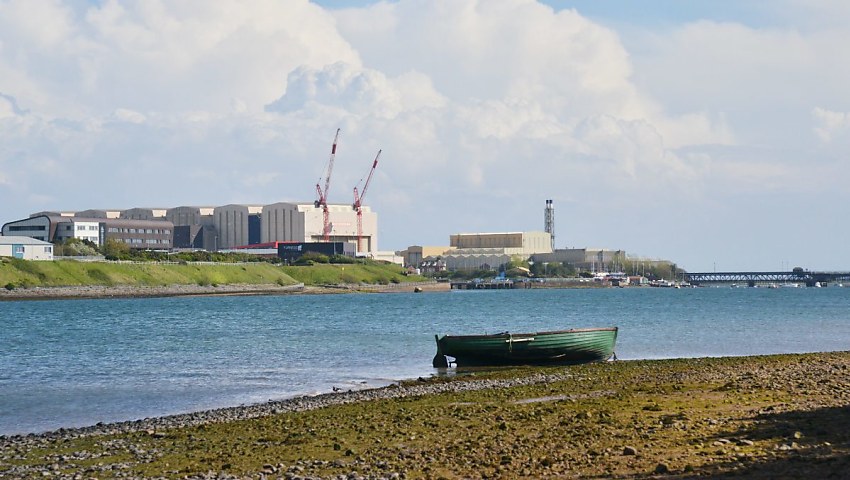Opinion: While it’s a lovely town, Barrow-in-Furness shows that the assembly of nuclear submarines will not create a vibrant local economy outside the walls of the defence industry. The government must have a conversation about the role of security, AUKUS, and nuclear submarines to justify the sticker price of Australia’s future submarine industry without solely basing the argument on economic benefits, writes defence expert and director of Strategic Analysis Australia, Michael Shoebridge.
It’s a real positive that Prime Minister Anthony Albanese took the time to visit Barrow-in-Furness, the UK town which, together with Adelaide, will build the joint Australian-UK subs.
His visit demonstrated that the government is committed to the AUKUS deal. That’s good to hear given noises within parts of the Labor Party that have criticised both the prime minister and his senior cabinet minister over AUKUS and the submarines.
The prime minister said that the nuclear subs program was “about security, but it’s about something more as well. It’s about jobs. It’s about jobs and economic prosperity”.
“And I see this as being very similar to what the car industry provided for Australia in the post-war period. An industry that created jobs and security for communities during decades, but also had indirect spin-offs in other industries as well.”
He’s half right. The AUKUS subs program is indeed all about Australia’s national security.
But it isn’t about jobs or creating a wider high-technology economy through the production of the subs.
The Australian car industry produced tens of thousands of cheap, mass produced vehicles each year that were put to productive uses all across the Australian economy. (It was producing about 1 million vehicles per annum in 2000s.)
Assembling eight nuclear subs in partnership with the UK slowly over four decades is not at all like that. And, unlike cars and utes made locally, the best case for our future eight nuclear submarines is that they are never used for the purpose they were built.
The small Northern England town of Barrow-in-Furness whose people have been making the UK’s subs since the 1950s shows what a nuclear subs program actually does for jobs and growth: it provides very steady employment for a small number of people.
Prime Minister Albanese saw this for himself. He met apprentices whose fathers and families had built subs in the decades before them. They’re happy, but the average income in the town is about £32,000 a year — which is about AU$60,000.
BAE System’s facility in the town now employs about 10,000 people and is planned to grow to 17,000 because of AUKUS and other UK government work.
The Australian government has estimated that the Australian side of the AUKUS program will create a cumulative total of around 20,000 direct jobs over the next 30 years, including ADF, public service, and industry jobs. Of these, there’ll be “up to 8,500 direct jobs in the industrial workforce” that will look a bit like the BAE jobs in Barrow.
While it’s a lovely town, Barrow-in-Furness shows that nuclear subs do not build a vibrant high technology economy outside the walls of the defence industry. Across the larger Northern England economy, incomes are similar, but the area has de-industrialised over the last 70 years and is now mainly a services economy. Those technology spinoffs the prime minister hopes for are not much in evidence. Northern England is less prosperous than the South, which obviously benefits from the economic weight of the City of London.
A conversation with the Australian public about our security and the role that the AUKUS partnership and the nuclear submarines within have in ensuring security is essential to justify spending what’s going to be well over the current sticker price of $368 billion.
Basing this national conversation on the employment and economic spin-offs of the program would be a mistake if the goal is to have a sustainable foundation for this complex national — and international — program.
We need a more honest and more difficult discussion than that.
Michael Shoebridge is the founder and director of Strategic Analysis Australia, and former director of the Defence & Strategy program at ASPI.



